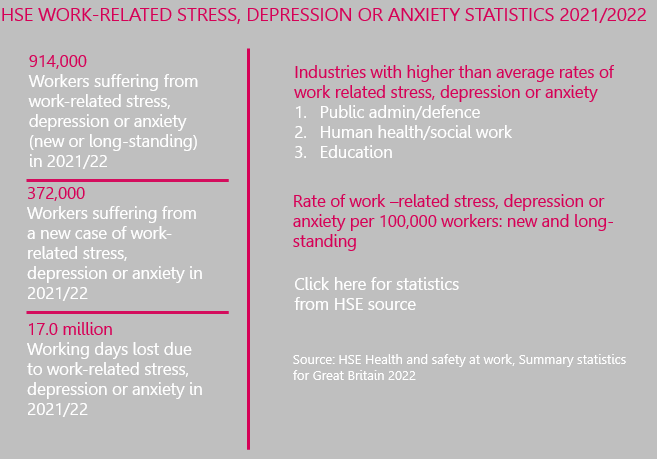The Statistics
The new figures confirm that stress, depression and anxiety are major forms of work-related illness in Great Britain as just over half (914,000) of the 1.8 million workers suffering from work-related ill health are said to suffer from one or more of these illnesses as a result of their work. This is a rise of 14% in the number of new and longstanding cases of workplaces stress, depression and anxiety from 800,000 cases in 2020/2021. Of these 914,000 workers, 372,000 are said to be suffering from a new case of work related stress, depression or anxiety. These figures are higher than the 2018/2019 pre-pandemic figures and it is recognised that the pandemic was a major contributory factor to work related stress, depression and anxiety.
The industries with higher than average rates of work-related stress, depression and anxiety include in order: public administration/defence, human health/social work and education.
Clearly employers are not doing enough to address the issue of work-related stress and poor mental health in the workplace, which is not only negatively impacting employees, but also Britain's economy, with an estimated 17 million of the 36.8 million working days lost in the 12 months evaluated being attributable to stress, depression or anxiety.
In the press release accompanying the statistics, the HSE Chief Executive, Sarah Albon, commented: "Stress and poor mental health is the number one cause of work-related ill health. The effects of stress, depression, and anxiety can have a significant impact on an employee’s life and on their ability to perform their best at work… we need all employers to do more and take seriously their responsibilities to support good mental health at work."
Employers need to realise that stress, depression and anxiety can be caused and aggravated by the workplace and should be considering how to prevent this as they would any other workplace hazard.
The HSE's approach and guidance
The HSE has been vocal about the topic in recent years and launched its "Working Minds" campaign in 2021 to encourage employers to tackle work related stress and remind employers of their responsibilities to their employee's mental health, after research highlighted that many employers were unaware of their legal duties and how to spot the signs of stress.
To support the campaign, the HSE has produced an area on their website which provides guidance on stress and mental health and work that can be found here, which includes the causes and signs of stress and mental health issues, how to do a risk assessment, manage risk and create a better work environment and talking toolkits to assist employers in talking to employees about stress and mental health.
The HSE in its ten-year strategic plan and 2022/2023 Business Plan has made clear its intention to focus effort on "areas of greatest health and safety challenge and where [they] can make the biggest contribution to benefit society" which includes work related stress and mental health and it will be interesting to see how this develops in terms of enforcement as we are yet to see significant enforcement action in this area.
DWF's Tier 1 Regulatory, Compliance and Investigations Team has a wealth of knowledge and experience and is here to assist you with any concerns you may have.
If you have any queries regarding the topics raised in this article, please do not hesitate to get in touch our experts.
Read the latest Regulatory, Compliance and Investigations Insights
Further information
- https://www.hse.gov.uk/statistics/overall/hssh2122.pdf
- https://press.hse.gov.uk/2022/11/23/hse-publishes-annual-work-related-ill-health-and-injury-statistics-for-2021-22/
- https://www.hse.gov.uk/aboutus/assets/docs/the-hse-strategy.pdf
- https://www.hse.gov.uk/aboutus/assets/docs/hse-business-plan.pdf
- https://www.hse.gov.uk/aboutus/assets/docs/the-hse-strategy.pdf
















